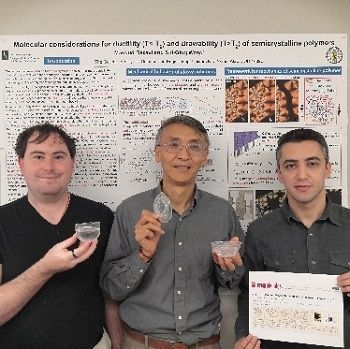A team from University of Akron is focusing on research that showcases effective strategies for turning brittle polymers into tough and flexible materials. The group has recently produced a prototype poly (lactic acid) (PLA) cup that is transparent, super tough and does not shrink when filled with boiling water.
Understanding PLA’s Processing-Structure-Property
PLA is the world’s foremost 100% biobased and fully compostable polymer. But it has low toughness and a low heat distortion temperature. It softens and structurally collapses around 140 degrees Fahrenheit, making it unusable in many hot food packing applications and disposable containers. The research could be disruptive technology because the prototype PLA cup is tough, transparent, and yet rigid to hold boiling water.
Professor Shi-Qing Wang, UA professor, has been trying to establish a knowledge base for understanding the processing-structure-property relationship for various plastics and applying the latest understanding to deal with the notorious brittleness of PLA.
Science Behind the Tough and Strong PLA Cup
To explain the science behind how the prototype PLA cup can gain ductility and achieve heat resistance, Wang uses the analogy of cooked spaghetti. If the molten PLA is magnified by a million times, each chainlike molecule would look like a strand of spaghetti, many meters in length. For thermoplastics (including PLA) to be tough, it is important that crystallization does not remove or disrupt the intertwining of “spaghetti strands”.
The interwoven structure is called the “chain network”. It is through such a structure that anyone can pick up nearly all of the spaghetti strands out of a bowl with a pair of chopsticks. This chain network, when properly manipulated, ensures that the PLA beverage cup is mechanically strong without crystallization. But such a commercial cup collapses when boiling water is poured into it. “Cups made from normally crystallized PLA can hold boiling water but are terribly brittle and opaque,” said Wang.
By investigating the origin of ductility in semi-crystalline polymers, Wang’s research group discovered a way to limit crystals to nanoscopic scales in PLA while preserving the network, resulting in the clear, tough and heat resistant cup. Such a transparent cup can hold hot tea and coffee and could replace most plastic beverage cups on the market.
“The impact of our new understanding could finally stimulate the PLA market to grow exponentially,” says Wang.
A U.S. patent on how to modify PLA based materials has been filed through UA’s Office of Technology Transfer.
Source: University of Akron
Packaging 360 is a comprehensive knowledge sharing ecosystem for the Indian packaging industry. Our services include an online content platform to deliver news, insights and case studies; organising conferences seminars and customised training; Providing Bespoke Project Consulting, Market Research and Intelligence.







